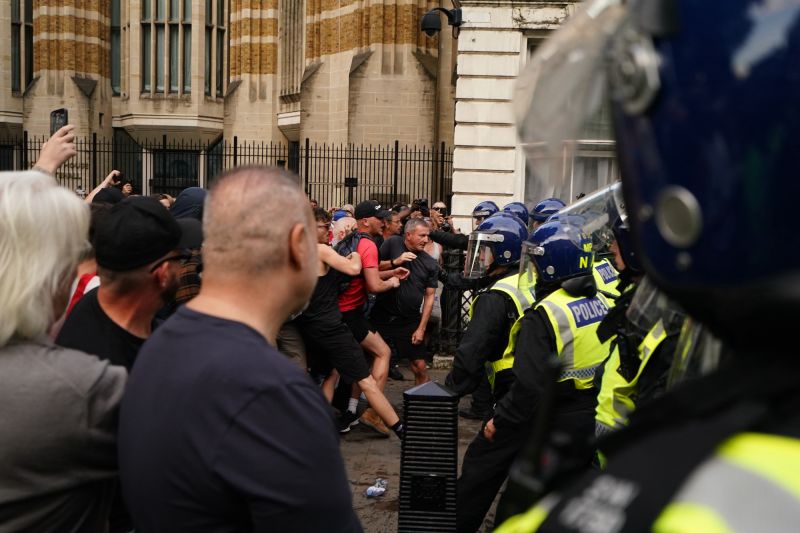‘Everybody is crying’: Israelis rejoice as 3 hostages returned after more than 470 days in Gaza
UK rocked by far-right riots fueled by online disinformation about Southport stabbings


Far-right demonstrations turned violent for a second night across England Wednesday, in the wake of this week’s mass stabbing in Southport – the worst attack on children in the country in recent history.
While a community continues to grieve the murder of three young girls, far-right agitators have mobilized around online misinformation and hateful, anti-migrant and anti-Muslim narratives – fueling disorder in London, Manchester and the northeastern town of Hartlepool.
Chaotic scenes unfolded in the capital on Wednesday night, with protesters from the “Enough is Enough” demonstration throwing bottles and cans at police, and hurling flares toward the gates of Downing Street while chanting far-right, anti-Islam slogans, including, “We want our country back.”
In Manchester, demonstrators wearing balaclavas gathered outside a hotel that houses asylum seekers, and in Hartlepool, police cars were set ablaze by a mob who carried sticks and pelted officers with objects.
More than 100 people in London were arrested for “violent disorder” and an “assault on an emergency worker,” according to the city’s Metropolitan Police. There were two arrests in Manchester, and eight in Hartlepool, according to police there.
The violence follows Tuesday’s night of unrest in the northwest English town of Southport, where a group of far-right protesters hurled bricks at a mosque, set cars and police vehicles on fire and clashed with police barely an hour after a peaceful vigil for Bebe King (6), Elsie Dot Stancombe (7) and Alice Dasilva Aguiar (9) was held across town.
Eight other children suffered stab wounds in the attack and five of them are in critical condition. Two adults also remain in critical condition after being injured in the attack, police said.
Prime Minister Keir Starmer condemned the scenes, saying the protesters “hijacked” the community’s grief.
Met police superintendent Neil Holyoak said that while “it is understandable the public have strong feelings” about the Southport stabbings, “the subsequent violent, unlawful disorder that unfolded was completely unacceptable and driven by misinformation.”
Shortly after Monday’s attack, far-right groups began to circulate a false name for the alleged attacker across social media, and falsely claimed that he was an asylum seeker.
The suspect is a 17-year-old from Banks, Lancashire. He was born in Cardiff, Wales, according to police.
Axel Rudakubana, who was charged with three counts of murder and 10 counts of attempted murder, was named on Thursday after a judge lifted reporting restrictions.
Less than 24 hours after the attack, however, before the suspect’s name had been released, the false name had already received over 30,000 mentions from more than 18,000 unique accounts on X alone – and was amplified by prominent far-right leaders, according to the Institute for Strategic Dialogue (ISD).
That false name had been also recommended to users through X’s algorithm, and was trending as a top recommended search result for users under the “What’s happening” sidebar.
“White nationalists will seize on any opportunity to spread misinformation about Muslims, about anyone who’s not White. So they were immediately on it – and were happy to spread basically whatever would confirm their presuppositions about who had done it,” he said.
Whether it was a malicious actor, or whether it was someone who was looking for “clicks,” is unclear, Squirrell added. “But we do know that the name that they gave out was made up… and that all the details are completely made up.”
Squirrell pointed to the fact that the viral posts about the alleged attacker said that he was on a watch list for MI6, Britain’s Secret Intelligence Service. However, MI5 – MI6’s internal counterpart – is the organization responsible for fighting domestic terrorism. “They gave out details that were basically designed to pick up the attention of the far-right, and also for anyone who is concerned about migration,” he said.
Algorithms tend to favor emotive, sensationalist, outrageous, engaging content – because they are based on engagement.
“Things that people on the far-right – or people who are interested in peddling misinformation as a way of getting engagement – tend to post things that will appeal to the algorithm,” Squirrell said. He added that, while the algorithm played a part, there was also a “huge amount of organizing happening” in a variety of different places that are not algorithmically oriented – for example in far-right groups on the instant-messaging platform Telegram.
Such Telegram groups have been instrumental in organizing these demonstrations.
Hope Not Hate, a UK advocacy group that campaigns against racism and fascism, identified one of the first Telegram groups that appeared on the encrypted social media network just hours after the Southport stabbings.
Like what was being shared on X and other platforms, the Telegram group “Southport Wake Up,” also posted false information about the alleged suspect. Hours after the attack, the group’s creator sent out the details for the first protest: Meet near a Southport mosque on Tuesday.
It was there that the violence began.
The “Southport Wake Up” group is still active, and on Thursday, posted calls for similar disruptions at Muslim centers in other cities across England.
Meanwhile, Prime Minister Starmer was set to meet with senior police leaders in London on Thursday.
In a statement, Downing Street said: “While the right to peaceful protest must be protected at all costs, he will be clear that criminals who exploit that right in order to sow hatred and carry out violent acts will face the full force of the law.”











